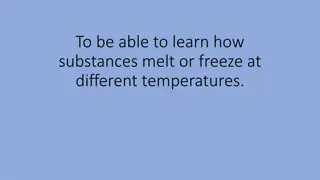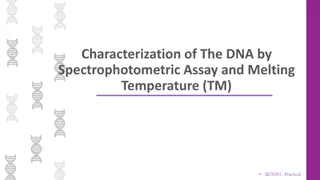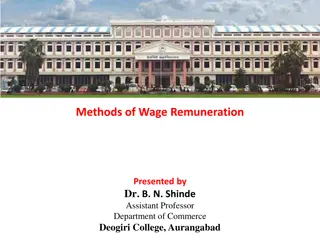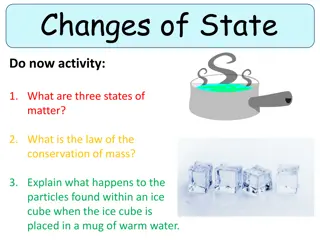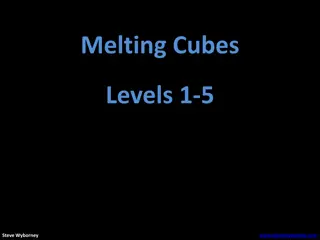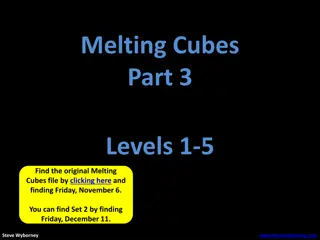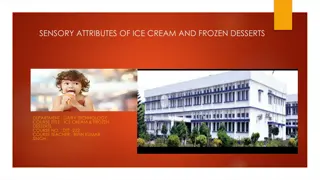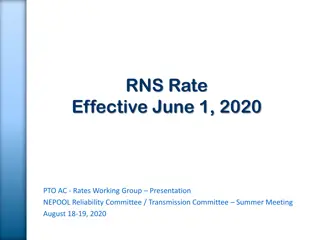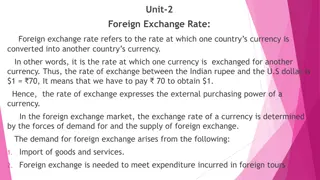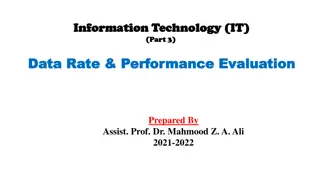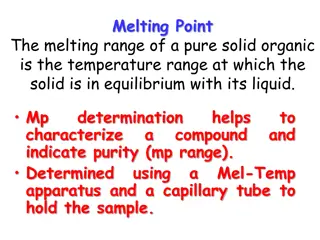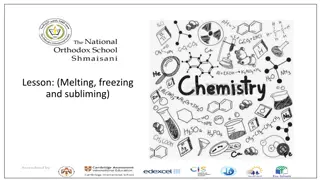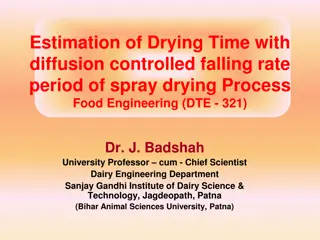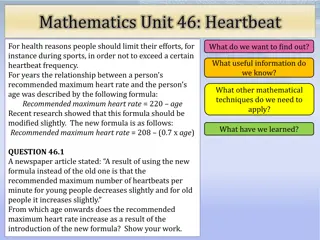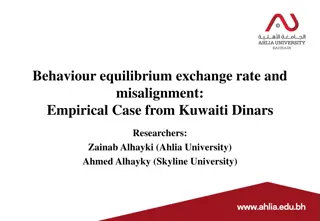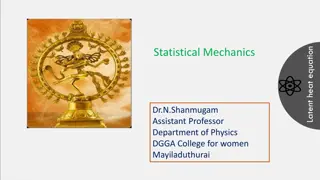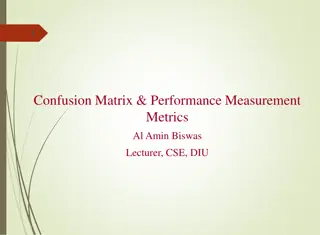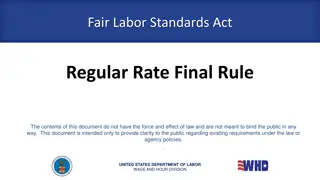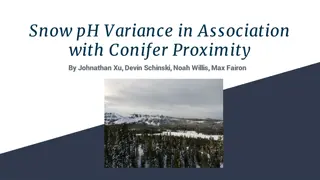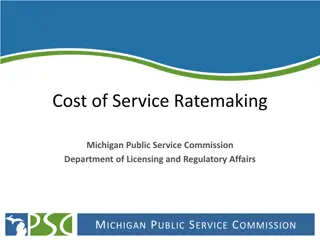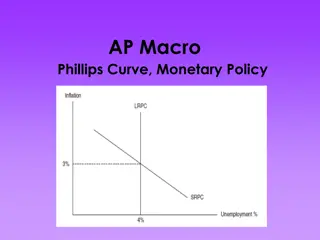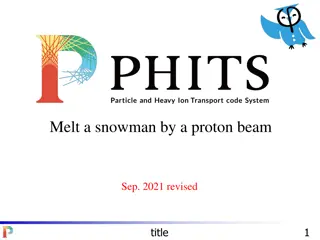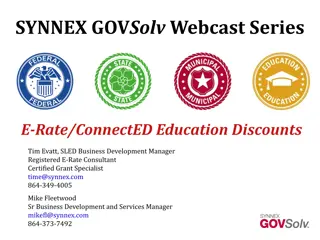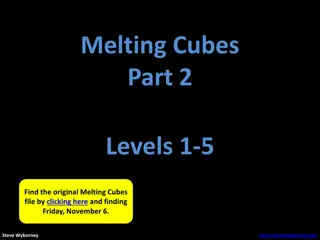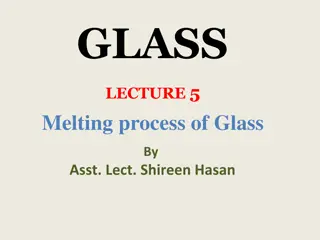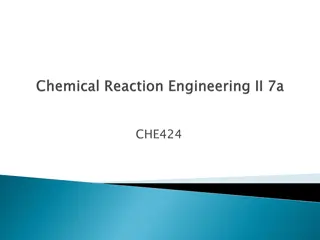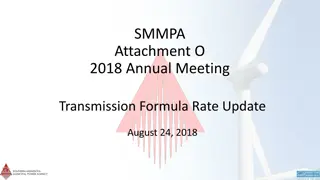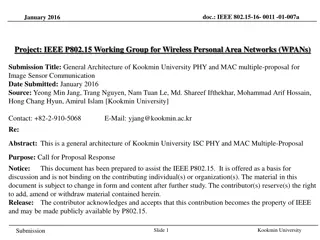Managing Interest Rate and Currency Risks: Strategies and Considerations
Interest rate and currency swaps are powerful tools for managing interest rate and foreign exchange risks. Firms face interest rate risk due to debt service obligations and holding interest-sensitive securities. Treasury management is key in balancing risk and return, with strategies based on expect
4 views • 21 slides
To be able to learn how substances melt or freeze at different temperatures.
Explore the three states of matter – solid, liquid, gas – and learn about the processes of melting and freezing. Discover how substances change state based on temperature variations, such as ice melting into water or water freezing into ice. Dive into the concepts of melting point, freezing poin
6 views • 11 slides
Improving Heat Rate Efficiency at Illinois Coal-Fired Power Plants
Heat rate improvements at coal-fired power plants in Illinois are crucial for enhancing energy conversion efficiency, reducing carbon intensity, and minimizing pollution. By increasing the heat rate/efficiency by 6%, these plants can generate more electricity while burning the same amount of coal. T
2 views • 11 slides
Comprehensive DNA Characterization Methods in Molecular Biology
Explore the various techniques involved in the characterization of DNA, including spectrophotometric assay, melting temperature determination, quantitative and qualitative analyses, DNA purity assessment, GC content calculation, and DNA denaturation processes. Learn how to determine DNA concentratio
0 views • 12 slides
Wage Remuneration Methods Overview
Dr. B. N. Shinde, Assistant Professor at Deogiri College, Aurangabad, presents an insightful overview of methods of wage remuneration including Time Rate System, Piece Rate System, and Combination of Time and Piece Rate System. Time Rate System is the oldest method where workers are paid based on ti
0 views • 16 slides
Understanding Changes of State in Matter
Explore the three states of matter, the law of conservation of mass, and what happens to particles in an ice cube when placed in warm water. Discover the importance of melting point, boiling point, and how impurities affect these points. Dive into temperature-time graphs to identify melting and boil
0 views • 13 slides
Experiment on Lightbulbs' Ability to Melt Chocolate
A group of students at Naul National School conducted an experiment to determine how different lightbulbs affect the melting of chocolate. They found that higher wattage bulbs melted the chocolate quicker, with older filament bulbs outperforming newer energy-saving ones. The study concluded that hig
0 views • 10 slides
Engaging Math Challenges with Melting Cubes by Steve Wyborney
Dive into the intriguing world of melting cubes with Steve Wyborney's engaging math challenges. Explore different levels, solve cube mysteries, and sharpen your number sense skills. Unveil the secrets hidden within the melting cubes as you unravel the puzzles one by one. Get ready for a fun and educ
0 views • 21 slides
Interactive Math Activity: Melting Cubes Levels 1-5
Engage students with the interactive math activity "Melting Cubes" featuring levels 1-5. Follow the provided guidelines for different grade levels, from K-1 to 4-8, and enhance students' understanding of spatial reasoning and counting. Access the original files for sets 1 and 2 to facilitate a seaml
0 views • 22 slides
Understanding Sensory Attributes of Ice Cream and Frozen Desserts in Dairy Technology
Ice cream and frozen desserts are formulated with dairy products, sugars, flavorings, and stabilizers. Various types are available, each with unique characteristics like flavor, body, texture, and melting quality. High-quality ice cream should possess a balanced flavor, desirable body, and smooth me
0 views • 13 slides
Transmission Rate Change Overview for June 1, 2020
Presentation on the Rate Change effective June 1, 2020, detailing RNS Rate adjustments, Annual Transmission Revenue Requirements, and Regional Forecasts. The RNS Rate increased to $129.26/kW-year reflecting transmission project impacts, while ATRR analysis showed changes in revenue requirements for
0 views • 25 slides
Understanding Foreign Exchange Rates and Market Forces
Foreign exchange rate is the rate at which one country's currency is converted into another's, reflecting purchasing power. The rate is determined by demand and supply in the foreign exchange market, influenced by factors like imports, exports, investments, and speculation. Equilibrium rate is reach
0 views • 42 slides
Understanding Data Rate Limits in Data Communications
Data rate limits in data communications are crucial for determining how fast data can be transmitted over a channel. Factors such as available bandwidth, signal levels, and channel quality influence data rate. Nyquist and Shannon's theoretical formulas help calculate data rate for noiseless and nois
0 views • 4 slides
Understanding Heart Rate Variations During Rest and Exercise
This experiment focuses on measuring heart rate at rest and after physical exercise, exploring the factors that influence heart rate changes. Through hands-on activities and theoretical lessons, students learn about the cardiac cycle, the circulatory system, and the impact of physical exertion on he
1 views • 22 slides
Understanding Melting Points in Organic Chemistry
Melting points play a crucial role in identifying compounds and assessing their purity. The melting range of a pure solid organic compound indicates its equilibrium temperature with its liquid form. Impurities can lower the melting point, causing depression and broadening of the melting range. Mixed
9 views • 13 slides
Understanding Melting, Freezing, and Sublimation
Melting is the process of a substance changing from a solid to a liquid when heated, while freezing is the transition from a liquid to a solid when cooled. Sublimation involves the direct conversion of a solid into a gas. These phase transitions occur due to changes in temperature and energy distrib
0 views • 11 slides
Estimation of Drying Time in Spray Drying Process: Diffusion and Falling Rate Periods
The estimation of drying time in a spray drying process involves understanding diffusion-controlled falling rate periods, constant rate periods, and the mechanisms by which moisture moves within the solid. The drying rate curves depend on factors like momentum, heat and mass transfer, physical prope
0 views • 8 slides
Recommended Maximum Heart Rate Formula Adjustment Analysis
The recommended maximum heart rate formula has been updated from 220 - age to 208 * (0.7 * age). This alteration results in a slight decrease in maximum heart rate for young individuals and a slight increase for older individuals. We aim to determine the age at which the new formula causes an increa
0 views • 10 slides
Understanding Heat Balance in Fusion Welding
In fusion welding, the heat balance is crucial for melting the metal efficiently. Factors like heat transfer, melting point, and energy conversion affect the amount of heat available for welding. The combination of heat transfer and melting factors reduces the net heat available for welding, impacti
0 views • 12 slides
Empirical Analysis of Kuwaiti Dinar Exchange Rate Behavior and Misalignment
This research focuses on studying the behavior of the real equilibrium exchange rate (REER) of Kuwaiti Dinars, estimating the equilibrium exchange rate using the BEER model, and calculating real exchange misalignments (RERM). It delves into the impact of exchange rate fluctuations on macroeconomic v
0 views • 15 slides
Understanding Phase Transformations and Latent Heat Equation in Statistical Mechanics
In this informative piece by Dr. N. Shanmugam, Assistant Professor at DGGA College for Women, Mayiladuthurai, the concept of phase transformations in substances as they change states with temperature variations is explored. The latent heat equation is discussed along with definitions of fusion, vapo
1 views • 22 slides
Understanding Confusion Matrix and Performance Measurement Metrics
Explore the concept of confusion matrix, a crucial tool in evaluating the performance of classifiers. Learn about True Positive, False Negative, False Positive, and True Negative classifications. Dive into performance evaluation metrics like Accuracy, True Positive Rate, False Positive Rate, False N
3 views • 13 slides
Understanding Regular Rate Calculation under Fair Labor Standards Act
The Fair Labor Standards Act (FLSA) is a federal law requiring employers to pay minimum wage and overtime compensation. Overtime pay is based on the regular rate of pay and hours worked in a workweek. The regular rate is calculated by dividing total earnings by total hours worked in the workweek and
0 views • 27 slides
Snow pH Variance in Relation to Conifer Proximity Study
Investigating the impact of conifer proximity on snow pH and melting rates, this study hypothesized that closer proximity to trees would result in lower pH levels and slower melting. By analyzing snow samples from varying distances around conifer trees and conducting experiments, the study confirmed
0 views • 11 slides
Michigan Public Service Commission - Rate Setting and Regulation Process
The Michigan Public Service Commission oversees the rate setting and regulation process for electric utilities in Michigan. This involves determining revenue requirements, allocating costs to customer classes, conducting cost of service studies, and designing rates to recover costs. The commission a
0 views • 36 slides
Understanding Changes in Glaciers Over Time - EARTH 2017 Lesson
Explore the lesson "I'm Melting, I'm Melting!" focusing on glaciers, Earth's materials cycling, global climate change analysis, and student objectives like developing glacier models. Engage in science practices, understand crosscutting concepts, and participate in engaging activities like ice cube d
0 views • 14 slides
Understanding the Phillips Curve and Its Implications
The Phillips Curve, introduced by economist A.W. Phillips in 1958, initially showed an inverse relationship between unemployment rate (u%) and inflation rate (tt%). This led policymakers to consider a trade-off between reducing unemployment and increasing inflation. However, the concept faced challe
0 views • 22 slides
Proton Beam Simulation for Melting Snowman in Gundam Analysis
Conducting a proton beam simulation to analyze the feasibility of the beam rifle in Gundam by melting a snowman. The exercise involves setting up geometry, defining parameters, sources, materials, and cells, and calculating energy deposition. Follow the flow chart to determine beam current and power
0 views • 19 slides
Addressing Sewer Rate Changes and Structural Remedies
City's sewer rate changes history and underfunding issues due to lack of cost centering, overburdening the general fund, and inadequate capital project funding. The methodology for rate review highlights the need for reflective rates to cover service costs. The current rate structure shows deficienc
0 views • 19 slides
Understanding E-Rate Program: Education Discounts & Benefits
The E-Rate Program, also known as Education Rate, offers discounts to schools and libraries for affordable telecommunications and Internet access. Administered by USAC, this program aims to provide crucial funding and support to educational institutions. With an annual budget of $3.9 billion and dis
0 views • 35 slides
Understanding Changes of State in Matter
Changes of state in matter refer to the physical transitions that substances undergo, such as melting, freezing, vaporization, and condensation. These transitions involve the addition or removal of energy, impacting the movement of particles and their arrangement. Despite the transformations, the id
0 views • 10 slides
Explore Melting Cubes Puzzle Adventure with Steve Wyborney
Delve into the fascinating world of Melting Cubes with levels of mystery and problem-solving challenges. Join Steve Wyborney on this engaging journey of visual puzzles, cube manipulation, and logical reasoning. Uncover the secrets hidden within the melting cubes as you progress through various level
0 views • 21 slides
Understanding Glacier Melting: Exploring the Energy Balance of Glaciers
The University of Canterbury College of Science Outreach Programme delves into the intriguing topic of glacier melting, particularly focusing on the energy balance of glaciers. The discussion covers whether glaciers melt at night, the factors influencing glacier melt, and how glaciers can be viewed
0 views • 18 slides
Understanding the Melting Process of Glass
The melting process of glass involves introducing a batch into a furnace at high temperatures for conversion into a glass melt through various chemical reactions such as decarbonation and dissolution. Initial heating releases moisture, and gas is released during decomposition, affecting homogenizati
0 views • 22 slides
Understanding Rate Expressions in Heterogeneous Systems
In heterogeneous systems, the rate expression involves mass transfer terms alongside chemical kinetics terms due to the presence of multiple phases. Different types of heterogeneous systems have varying mass transfer complexities, making a general rate expression challenging to define. Examples such
0 views • 29 slides
SMMPA Annual Meeting Transmission Rate Update 2018
SMMPA, a not-for-profit political subdivision in Minnesota, updated its transmission rate formula in August 2018. The Attachment O timeline outlines crucial dates for stakeholders, including the annual meeting on formula rate updates. SMMPA, as a Transmission Owner in MISO, follows FERC-approved tem
0 views • 8 slides
Understanding Heart Rate and Pulse: Key Differences and Measurement
Heart rate, also known as pulse, is the number of times your heart beats per minute. It varies based on factors like age, fitness level, and emotions. Pulse is a direct measure of heart rate. Learn about the differences between heart rate and blood pressure, how to measure heart rate, and what const
0 views • 8 slides
Understanding Metallic Bonding and Its Properties
Metallic bonding involves the delocalization of electrons among metal atoms, creating a unique structure known as the electron sea. This structure allows for properties such as high melting points, conductivity of heat and electricity, malleability, and ductility. Metals are able to conduct heat and
0 views • 12 slides
EU-Serbia-Romania Cross-border Cooperation on Ecologic Filler Alloys for Soldering
This project, funded by the European Union Structural Funds 2007-2013, involves a collaboration between the Serbian and Romanian governments to develop new ecologic filler alloys for soldering. The initiative aims to promote the use of non-ferrous ores from the Romanian-Serbian cross-border area to
0 views • 10 slides
General Architecture of Kookmin University's Image Sensor Communication Proposal
Kookmin University submitted a proposal to the IEEE P802.15 Working Group for Wireless Personal Area Networks, focusing on the PHY and MAC layers for image sensor communication. The document outlines design principles, specifications, frame formats, and considerations for both layers. Definitions re
0 views • 41 slides

